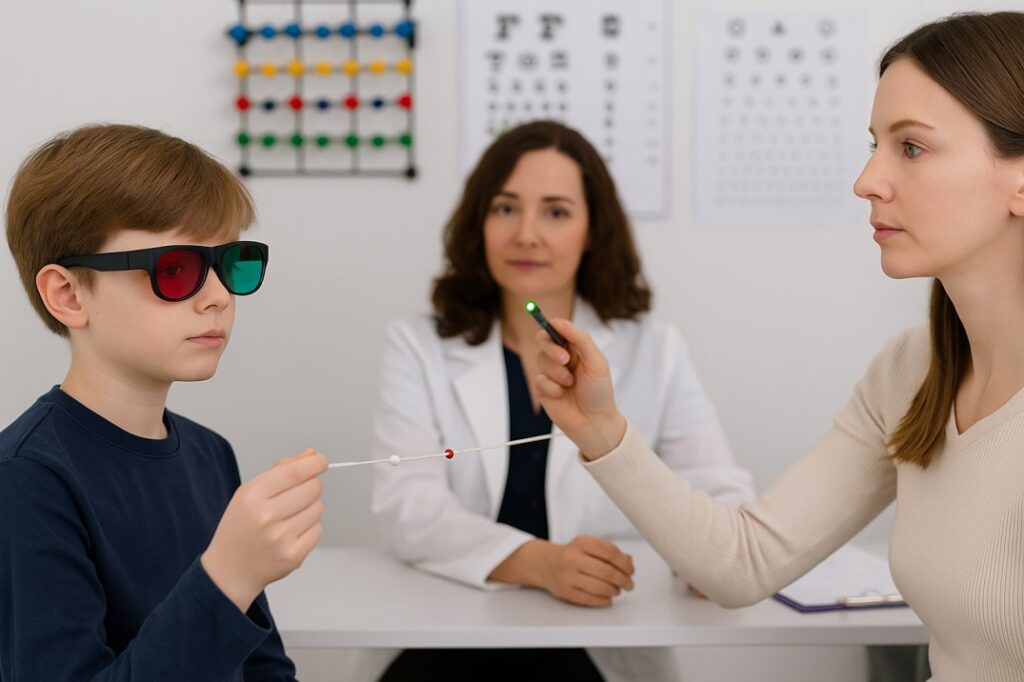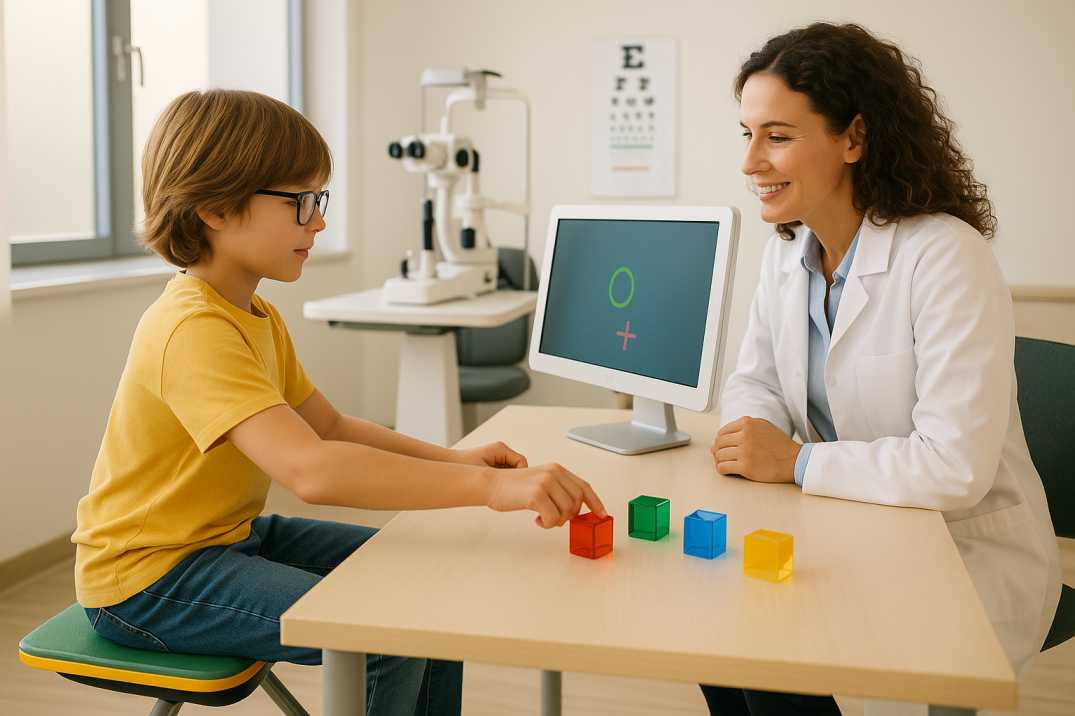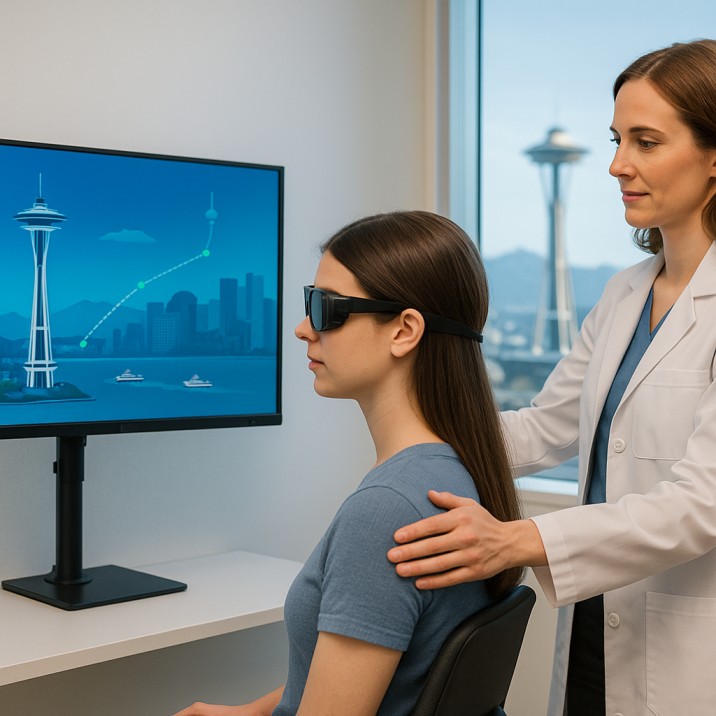Seattle Vision Therapy for Kids & Adults
How Does Vision Therapy Work?
Vision therapy is a personalized, doctor-supervised program at Cannon EyeCare in Seattle, WA, that enhances how your eyes and brain process visual information. Unlike glasses or contacts (which only sharpen focus), this neuro-optometric treatment trains your visual system to work efficiently, crucial for lasting comfort even with 20/20 vision.
Key benefits for Seattle patients:
- Customized for all ages – Children and adults
- Treats the root causes of:
– Eye teaming/tracking problems
– Focus fatigue
– Visual processing delays - Proven help for:
– Learning challenges (dyslexia, ADHD)
– Post-concussion symptoms
– Digital eye strain from screens
Why 20/20 Vision Isn’t Enough for Seattle’s Demands
While clear distance vision is important, true visual health requires three integrated skills for reading, screens, and daily life in our tech-heavy city:
1. Eye Teaming (Binocular Vision)
Can your eyes coordinate like a synchronized team? Poor teaming causes double vision or headaches during Seattle commutes.
2. Eye Tracking & Focusing
Can you smoothly shift focus between screens, books, and road signs? Weak tracking strains productivity in school or downtown offices.
3. Visual Processing
Does your brain quickly interpret what you see? Slow processing affects learning speed at local schools like UW or Bellevue College.
Even with 20/20 sight, weak skills create:
✦ Reading fatigue at Seattle Public Library
✦ Attention struggles in classrooms
✦ Sports coordination issues on Rainier fields
Who Benefits Most from Vision Therapy in Seattle?
Vision therapy isn’t just for children. At Cannon EyeCare, our Seattle doctors recommend customized programs for:
✧ Children Showing:
✓ Reading struggles at Seattle schools (skipping lines, letter reversals)
✓ Homework headaches or avoidance
✓ Clumsiness during playground activities
✧ Adults Experiencing:
✓ Screen fatigue at Amazon/Microsoft jobs
✓ “Seattle fog” headaches after computer work
✓ Blurred vision switching between devices
✧ Post-Concussion Patients:
✓ Light sensitivity driving I-5 at night
✓ Dizziness navigating steep Queen Anne hills
✓ Focus on issues post-accident
✧ Athletes Needing:
✓ Sharper hand-eye coordination for Mariners/Sounders
✓ Better depth perception on Rainier hikes
✓ Faster reaction times in competition
Vision Therapy Symptoms: Seattle-Specific Warning Signs
Use this checklist from Cannon EyeCare’s specialists to identify visual dysfunction in daily Seattle life:
✧ Children in Seattle Schools May Show:
✓ Reading Struggles
-
Head tilting at Seattle Public Library books
-
Skipping lines during homework
-
Letter reversals (b/d, p/q)
✓ Physical Discomfort
-
Homework headaches after 30 minutes
-
Nausea on school bus routes
-
Holding devices <10 inches away
✓ Behavioral Clues
-
Avoids reading at Woodland Park Zoo exhibits
-
Poor ball-catching skills at the playground
-
Rubs eyes during screen time
✧ Adults in Seattle Workplaces Often Report:
✓ Screen-Related Strain
-
Fatigue at Amazon/Microsoft workstations
-
“After-5 blur” driving I-5 home
-
Double vision switching Slack/Zoom screens
✓ Focus Challenges
-
Loses place in reading contracts
-
Closes one eye reviewing spreadsheets
-
Headaches after Pike Place Market screen use
✓ Daily Task Difficulties
-
Motion sickness on ferry commutes
-
Light sensitivity in Lumen Field stadiums
✧ Urgent Red Flags for All Ages:
- Persistent blurred vision at dusk
- Trouble shifting focus (Space Needle → phone map)
- Dizziness navigating Capitol Hill stairs
- Concentration fails during 1-hour tasks
Common Causes of Vision Problems in Seattle
Functional vision symptoms often originate from specific neurological or coordination issues. At Cannon EyeCare, we find these are the most frequent underlying causes among Seattle patients:
-
Binocular Vision Disorders
Conditions like convergence insufficiency (eye strain during near work), strabismus (eye misalignment), or amblyopia (“lazy eye”) disrupt how eyes collaborate. -
Eye Movement and Tracking Deficits
Difficulty following text lines smoothly or shifting focus between objects, particularly challenging for Seattle students reading in dim classrooms. -
Visual Processing Problems
Delays in how the brain interprets visual information can affect reading comprehension or spatial awareness. -
Post-Injury Complications
Concussions from Seattle sports or accidents can damage visual processing pathways. -
Technology-Induced Strain
Prolonged screen exposure at Amazon/Microsoft jobs leads to focusing fatigue and dry eyes – now termed “Seattle Screen Syndrome” by local specialists.
Why These Are Often Missed:
Standard eye exams prioritize measuring visual acuity (20/20 clarity) rather than testing functional teamwork between eyes and brain. Only specialized assessments like those at Cannon EyeCare detect these coordination issues.
The Vision Therapy Process at Cannon EyeCare in Seattle
Vision therapy rebuilds neural pathways through structured exercises that strengthen eye-brain coordination. Seattle patients at Cannon EyeCare experience a tailored approach:
Step 1: Advanced Seattle-Specific Evaluation
Our specialists conduct 90-minute assessments testing:
-
Eye teaming (binocular vision)
-
Tracking accuracy for reading
-
Visual processing speed
Identifies root causes that standard exams miss
Step 2: Customized Treatment Plan
-
Weekly 45-minute sessions with Cannon EyeCare doctors
-
Personalized home exercises
-
Seattle-centric strategies (screen fatigue solutions for tech workers)
Step 3: Progress Monitoring
Bi-monthly reassessments track improvements in:
-
Reading speed at Seattle schools
-
Screen tolerance for professionals
-
Post-concussion symptom reduction
Collaborative Care Model
For complex cases (e.g., post-accident or learning disabilities), we partner with:
-
Seattle Children’s occupational therapists
-
UW Medicine rehabilitation specialists
-
Local school IEP teams
Innovative Seattle-Tested Tools
-
VR systems simulating I-5 driving visual demands
-
App-based exercises for Microsoft/Amazon employees
-
Neuro-tracking technology
Proven Vision Therapy Results for Seattle Patients
At Cannon EyeCare, our vision therapy programs deliver measurable improvements tailored to Northwest lifestyles:
Academic & Work Performance
-
Students: 40-60% faster reading speed at Seattle schools with better comprehension
-
Professionals: Reduced screen headaches at Microsoft/Amazon workplaces
-
Sustained focus during the Seattle rainy season, and indoor activities
Daily Comfort & Safety
-
Elimination of “Seattle fog” eye strain during commutes
-
Improved depth perception for hiking Rainier trails
-
Reduced light sensitivity while driving on I-5 at night
Athletic & Rehabilitation Gains
-
Sharper hand-eye coordination for soccer at Starfire Sports
-
Quicker reaction times post-concussion (UW Medicine-verified outcomes)
-
Stable vision for ferry commutes and moving walkways
Peer-reviewed studies in the Journal of Optometry confirm that 89% of patients achieve lasting results for binocular disorders within 3-6 months of our structured programs.
Why Choose Cannon EyeCare:
-
Only Seattle clinic with VR progress-tracking for real-world simulations
-
Custom rainy-season maintenance plans
-
Collaboration with Seattle Children’s and UW Rehabilitation
FAQs
-
Blurry or double vision, headaches, eye strain, losing place while reading, and difficulty focusing are common signs




